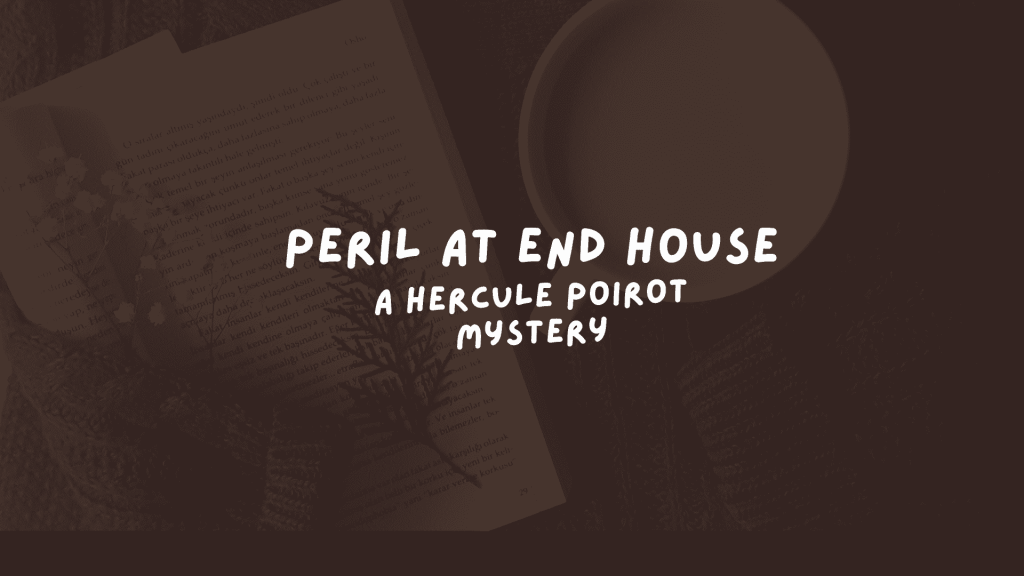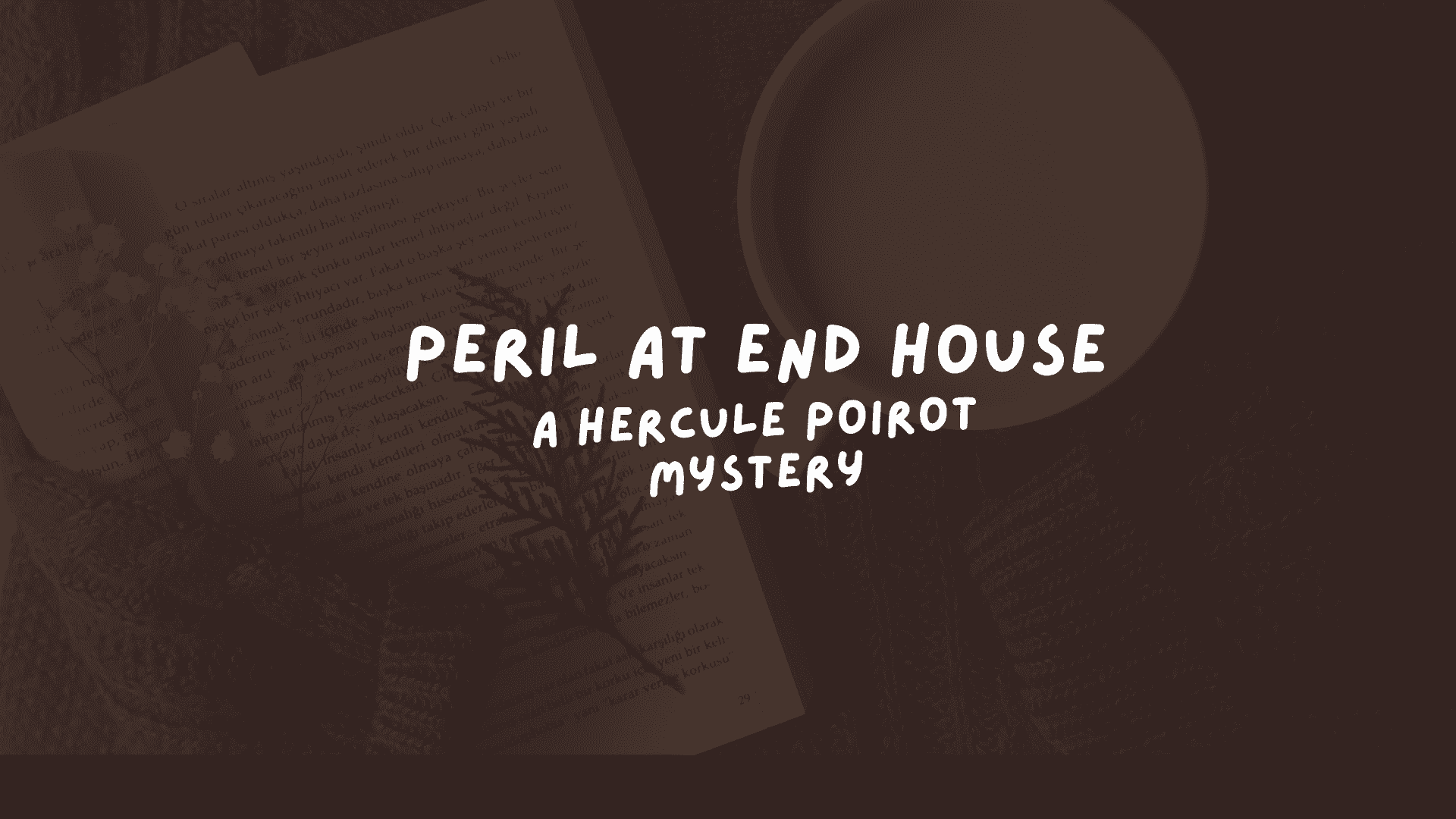Peril at End House Chapter-6: A Call Upon Mr. Vyse Poirot clung firmly to the Continental breakfast. To see me consuming eggs and bacon upset and distressed him-so he always said. Consequently, he breakfasted in bed with coffee and rolls and I was free to start the day with the traditional Englishman’s breakfast of bacon and eggs and marmalade.
I looked into his room on Monday morning as I went downstairs. He was sitting up in bed arrayed in a very marvelous dressing gown.
‘Bonjour, Hastings. I was just about to ring. This note that I have written, will you be so good as to get it taken over to End House and delivered to Mademoiselle at once.’
I held out my hand for it. Poirot looked at me and sighed.
‘If only-if only, Hastings, you would part your hair in the middle instead of at the side! What a difference it would make to the symmetry of your appearance. And your mustache. If you must have a mustache, let it be a real mustache-a thing of beauty such as mine.’
Repressing a shudder at the thought, I took the note firmly from Poirot’s hand and left the room.
I had rejoined him in our sitting room when word was sent up to say Miss Buckley had called. Poirot gave the order for her to be shown up.
She came in gaily enough, but I fancied that the circles under her eyes were darker than usual. In her hand,, she held a telegram which she handed to Poirot.

‘There,’ she said. ‘I hope that will please you!’
Poirot read it aloud.
‘Arrive at 5.30 today. Maggie.’
‘My nurse and guardian!’ said Nick. ‘But you’re wrong, you know. Maggie’s got no kind of brains. Good work is about all she’s fit for. That and never seeing the point of jokes. Freddie would be ten times better at spotting hidden assassins. And Jim Lazarus would be better still. I never feel one has got to the bottom of Jim.’
‘And the Commander Challenger?’
‘Oh! George! He’d never see anything till it was under his nose. But he’d let them have it when he did see. Very useful when it came to a show-down, George would be.
‘ She tossed off her hat and went on: ‘I gave orders for the man you wrote about to be let in. It sounds mysterious. Is he installing a dictaphone or something like that?’
Poirot shook his head.
‘No, no, nothing scientific. A very simple little matter of opinion, Mademoiselle. Something I wanted to know.’
‘Oh, well,’ said Nick. ‘It’s all great fun, isn’t it?’ ‘Is it,
Mademoiselle?’ asked Poirot, gently.
She stood for a minute with her back to us, looking out of the window. Then she turned. All the brave defiance had gone out of her face. It was childishly twisted awry, as she struggled to keep back the tears.
‘No,’ she said. ‘It-it isn’t, really. I’m afraid-I’m afraid. Hideously afraid. And I always thought I was brave.’ ‘So you are, mon enfant, so you are. Both Hastings and I, have admired your courage.’
‘Yes, indeed,’ I put in warmly.
‘No,’ said Nick, shaking her head. ‘I’m not brave. It’s-it’s the waiting. Wondering the whole time if anything more was going to happen. And how it’ll happen! And expecting it to happen.’
‘Yes, yes it is the strain.’
‘Last night I pulled my bed out into the middle of the room. And fastened my window and bolted my door. When I came here this morning, I came round by the road. I couldn’t-I simply couldn’t come through the garden. It’s as though my nerve had gone all of a sudden. It’s this thing coming on top of everything else.’
‘What do you mean exactly by that, Mademoiselle? On top of everything else?’
There was a momentary pause before she replied.
‘I don’t mean anything particular. What the newspapers call “the strain of modern life”, I suppose. Too many cocktails, too many cigarettes-all that sort of thing. It’s just that I’ve got into a ridiculous sort of-of state.’
She had sunk into a chair and was sitting there, her small fingers curling and uncurling themselves nervously.
‘You are not being frank with me, Mademoiselle. There is something.’
‘There isn’t-there really isn’t.’
‘You haven’t disclosed everything to me.’
‘I’ve told you every single smallest thing.’
She spoke sincerely and earnestly.
‘About these accidents-about the attacks upon you, yes.’
‘Well-then?’
‘But you have not told me everything that is in your heart-in your life…’
She said slowly: ‘Can anyone do that…?’
‘Ah! then,’ said Poirot, with triumph. ‘You admit it!’
She shook her head. He watched her keenly.
‘Perhaps,’ he suggested, shrewdly. ‘It is not your secret?’
I thought I saw a momentary flicker of her eyelids. But almost immediately she jumped up.
‘Really and truly, M. Poirot, I’ve told you every single thing I know about this stupid business. If you think I know something about someone else, or have suspicions, you are wrong. It’s having no suspicions that are driving me mad! Because I’m not a fool. I can see that if those “accidents” weren’t accidents, they must have been engineered by somebody very near at hand-somebody who knows me. And that’s what is so awful. Because I haven’t the least idea-not the very least-who that somebody might be.’
She went over once more to the window and stood looking out. Poirot signed to me not to speak. I think he was hoping for some further revelation, now that the girl’s self-control had broken down.
When she spoke, it was in a different tone of voice, a dreamy far-away voice.
‘Do you know a queer wish I’ve always had? I love End House. I’ve always wanted to produce a play there. It’s got the an-an atmosphere of drama about it. I’ve seen all sorts of plays staged there in my mind. And now it’s as though a drama were being acted there. Only I’m not producing it… I’m in it! I’m right in it! I am, perhaps, the person who dies in the first act.’
Her voice broke.
‘Now, now, Mademoiselle.’ Poirot’s voice was resolutely brisk and cheerful. ‘This will not do. This is hysteria.’
She turned and looked at him sharply.
‘Did Freddie tell you I was hysterical?’ she asked. ‘She says I am, sometimes. But you mustn’t always believe what Freddie says. There are times, you know when when she isn’t quite herself.’
There was a pause, then Poirot asked a totally irrelevant question: ‘Tell me, Mademoiselle,’ he said. ‘Have you ever received an offer for End House?’
‘To sell it, do you mean?’
‘That is what I meant.’
‘No.’
‘Would you consider selling it if you got a good offer?’
Nick considered for a moment.
‘No, I don’t think so. Not, I mean, unless it was such a ridiculously good offer that it would be perfectly foolish not to.’
‘Précisément.’
‘I don’t want to sell it, you know, because I’m fond of it.’
‘Quite so. I understand.’
Nick moved slowly towards the door.
‘By the way, there are fireworks tonight. Will you come? Dinner at eight o’clock. The fireworks begin at nine-thirty. You can see them splendidly from the garden where it overlooks the harbor.’
‘I shall be enchanted.’
‘Both of you, of course,’ said Nick.
‘Many thanks,’ I said.
‘Nothing like a party for reviving the drooping spirits,’ remarked Nick. And with a little laugh, she went out.
‘Pauvre enfant,’ said Poirot.
He reached for his hat and carefully flicked an infinitesimal speck of dust from its surface.
‘We are going out?’ I asked.
‘Mais oui, we have a legal business to transact, mon ami.’
‘Of course. I understand.’
‘One of your brilliant mentality could not fail to do so, Hastings.’
The offices of Messrs Vyse, Trevannion & Wynnard were situated in the main street of the town. We mounted the stairs to the first floor and entered a room where three clerks were busily writing. Poirot asked to see Mr. Charles Vyse.
A clerk murmured a few words down a telephone, received, apparently, an affirmative reply, and remarking that Mr. Vyse would see us now, he led us across the passage, tapped on a door, and stood aside for us to pass in.
From behind a large desk covered with legal papers, Mr. Vyse rose up to greet us.
He was a tall young man, rather pale, with impassive features. He was going a little bald on either temple and wore glasses. His coloring was fair and indeterminate.
Poirot had come prepared for the encounter. Fortunately, he had with him an agreement, as yet unsigned, and so on some technical points in connection with this, he wanted Mr. Vyse’s advice.
Mr. Vyse, speaking carefully and correctly, was soon able to allay Poirot’s alleged doubts, and to clear up some obscure points of the wording.
‘I am very much obliged to you,’ murmured Poirot. ‘As a foreigner, you comprehend, these legal matters, and phrasing are most difficult.’
It was then that Mr. Vyse asked who had sent Poirot to him.
‘Miss Buckley,’ said Poirot, promptly. ‘Your cousin, is she not? A most charming young lady. I happened to mention that I was in perplexity and she told me to come to you. I tried to see you on Saturday morning-about half-past twelve-but you were out.’
‘Yes, I remember. I left early on Saturday.’
‘Mademoiselle your cousin must find that large house very lonely. She lives there alone, I understand.’ ‘Quite so.’
‘Tell me, Mr. Vyse, if I may ask, is there any chance of that property being in the market?’
‘Not the least, I should say.’
‘You understand, I do not ask idly. I have a reason! I am in search, myself, of just such a property. The climate of St Loo enchants me. It is true that the house appears to be in bad repair, there has not been, I gather, much money to spend on it. Under those circumstances, is it not possible that Mademoiselle would consider an offer?’
‘Not the least likelihood of it.’ Charles Vyse shook his head with the utmost decision. ‘My cousin is absolutely devoted to the place. Nothing would induce her to sell, I know. It is, you understand, a family place.’
‘I comprehend that, but-‘ ‘It is absolutely out of the question. I know my cousin. She has a fanatical devotion to the house.’
A few minutes later we were out in the street again.
‘Well, my friend,’ said Poirot. ‘And what impression did this M. Charles Vyse make upon you?’
I considered.
‘A very negative one,’ I said at last. ‘He is a curiously negative person.’
‘Not a strong personality, you would say?’
‘No, indeed. The kind of man you would never remember on meeting him again.
A mediocre person.’
‘His appearance is certainly not striking. Did you notice any discrepancy in the course of our conversation with him?’
‘Yes,’ I said slowly, ‘I did. With regard to the selling of End House.’
‘Exactly. Would you have described Mademoiselle Buckley’s attitude towards End House as one of “fanatical devotion”?’
‘It is a very strong term.’
‘Yes-and Mr. Vyse is not given to using strong terms. His normal attitude-a legal attitude is to under, rather than the over, state. Yet he says that Mademoiselle has a fanatical devotion to the home of her ancestors.’
‘She did not convey that impression this morning,’ I said. ‘She spoke about it very sensibly, I thought. She’s obviously fond of the place-just as anyone in her position would be-but certainly nothing more.’
‘So, in fact, one of the two is lying,’ said Poirot, thoughtfully.
‘One would not suspect Vyse of lying.’
‘Clearly, a great asset if one has any lying to do,’ remarked Poirot. ‘Yes, he has quite the air of a George Washington, that one. Did you notice another thing, Hastings?’
‘What was that?’
‘He was not in his office at half-past twelve on Saturday.’
Read Peril at End House Novel All Parts Free Online
- The Peril at End House By Agatha Christie Novel Complete Review
- Peril at End House Chapter 1: The Majestic Hotel
- Peril at End House Chapter 2: End House
- Peril at End House Novel Chapter-3: Accidents?
- Peril at End House Chapter-4: There Must Be Something!?
- Peril at End House Chapter-5: Mr and Mrs Croft

